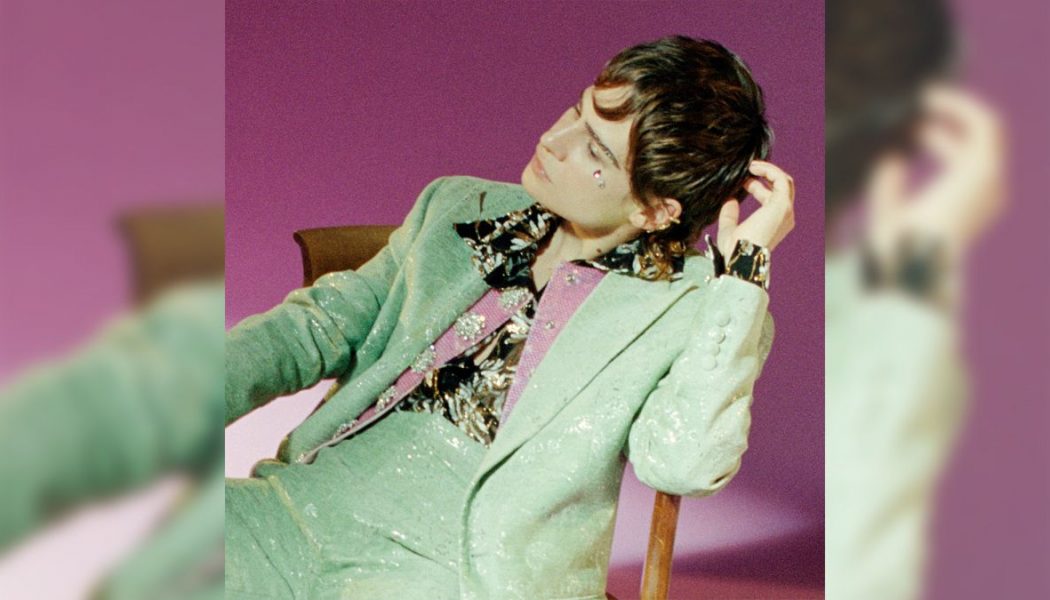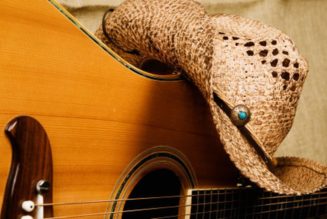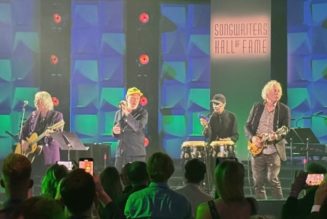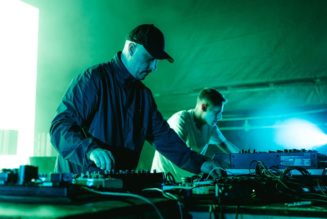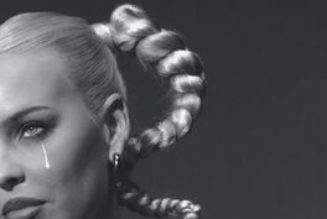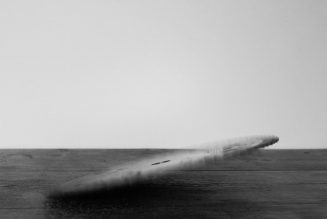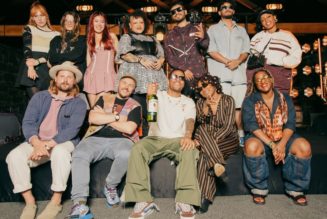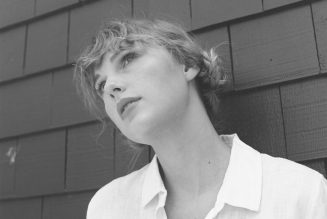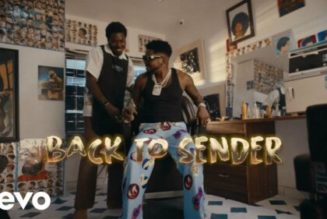As our Annual Report continues, we’re taking a look at several ways live music changed in a year where most of the world was in lockdown. Today, we share our conversation with Christine and the Queens, an artist with a unique approach to quarantine performances.
As Héloïse Letissier presumes, there probably are some “really insular musicians” who found the lack of touring this year somewhat calming. Under her moniker of Christine and the Queens, the French pop star is not one of those artists.
“I’m always saying I come from theater, but it kind of formed a relationship I have with the stage that is very much essential,” she tells Consequence of Sound over Zoom from her Paris home.
Performance is in fact entirely indispensable when it comes to the concept of Christine and the Queens. Just take a look at the theatricality of the short film accompanying her La vita nouva EP from pre-pandemic 2020 or the majestic storytelling of her tour behind 2018’s Chris. Letissier is a performer, through and through, so you can only imagine the agony of having to be kept from the stage due to COVID-19.
Which is why she was one of the first to take a truly artistic approach to livestreaming. An early adapter to weekly Instagram Live sessions, Letissier sought out meaningful ways to express herself in limited conditions. The simple act of angling a camera towards a window as she sat on the sill to sing “People, I’ve been sad” (one of the year’s best songs) for Colbert demonstrated the thoughtfulness of her at-home presentation. Eventually, she branched out to staging performances at empty museums and opera houses, all in service of the La vita aesthetic.
Editors’ Picks
Sitting in a studio or on a couch playing for a computer screen wasn’t going to cut it for someone like Christine and the Queens. For her, performance is always an extension of the music, not simply a medium by which it’s transmitted. “It feels also it’s back to who means it, and what do you mean?” she explains. “You know what I mean? It was so fucked up for everybody that it kind of boiled down to, ‘What do you want to say?’”
Letissier found what she wanted to say in dramatically deliberate fashion, perhaps more so than any other musician during quarantine. Consequence of Sound spoke to her about how she adapted her powerful stage presence to lockdown, what it meant to sing for a remote audience, and how she cautiously looks forward to getting back to venues. Above, watch “Christine and the Queens: Finding a Stage in Quarantine”, and read a full transcription of the interview below.
Editor’s Note: Join Consequence of Sound in the fight to protect live music by picking up our new original shirt. A portion of all proceeds go towards independent music venues in their recovery efforts.
On How Performing at Home Was Returning to Her Roots
As you said, I think it was really progressive in the energy. I think the first thing I did was a genuine way to cope with the situation. I think I have two coping mechanisms that are working for me: It’s writing a song and performing it. It’s like the only thing that saves my ass on a regular basis. I remember the first thing I did was very low key. I was singing, Vincent Taurelle was playing the piano, and my other friends were filming, and it was literally like hours before the first lockdown in France. And it was immediately my reaction to that very anxiously infused moment of time. I was like, “Let’s perform.”
It’s funny because for me, it’s almost like circling back to the beginning of what I did with Christine and the Queens when I was younger, 10 years ago. Because it was very much about being stuck in my room. I mean, I knew no one in the music industry and I was coming from theater, so I was crafting little videos at my place. I mean, for people who have time to waste, they can check on YouTube in 2010; I was basically doing performances in my room, and so here I was again, older and with lots more happening in my life. But also back to that same idea that, you know, it’s all about finding a way to share.
Also I released an EP just before the lockdown, and I think I just wanted to perform it. I wanted to share it in one way or another. So, it was quite humbling, but interesting to do that exercise, because how do you convey an emotion through the lens of the camera? I think it’s just the idea of sharing that kind of enticed people at some point. You know, the eagerness to share something.
On Plans to Tour Behind the La vita nuova EP
I was lucky enough actually to have the idea around the EP be not to perform. It was kind of an in-between chapter that I had to address. I needed to free myself. It was really cathartic, but I didn’t have any tour planned. I had the idea of doing club nights, because La vita nuova ends up in the club. I actually did a club night in Paris and in London, and the plan was to do random club nights where I could sing loosely, but it was not like a proper tour. So, thank God because I know some fellow musicians who really have had to cancel a proper tour with a full record. And I think it’s an incredible mourning to do. It’s really harsh. I was luckier than that.
But it really made me realize how much, even with just one mic and my computer, it was very much about performing, my whole project. Because, I mean, even the song “People, I’ve been sad”, I was obsessed with the idea of just addressing that song very simply to faces. And this is what I basically missed the whole year, because you do perform, but you don’t have the immediate feedback from someone’s face. And as a performer, I think — I mean, I like the social media and I like to find a way to share, but there is something really magical in addressing a song to someone.
On Being Such a Physical Performer, Even at Home
Yeah, I can’t help that. I think it’s deeply rooted to something very physical that happens when I sing. Actually, for example, I’m an okay piano player, but I never succeeded in doing a good live session because I always want to use my hands. It’s really coming from, I don’t know, I like to dance the songs and sing them. It depends also on how you want to perform, but I physically engage with every song I’m performing and this is just something I cannot help. It’s just natural. It seems a bit weird that I could be just like in my world, in my room with my mic, but it’s also basically what I did the whole time before I became a singer.
It was like circling back to teenage years. I spent hours and hours of dreaming and dancing, improvising, hoping in my room. It was really tender, actually, this year, because I did a lot of soul searching, like lots of people could find. It’s quite moving because you get back to the root of why you’re doing that strange job of yours, and it’s still the same pull. I think it was making sense for me because I dreamt the whole time in my room like that before. Coming back to that room with the experience of the stage and being so lucky to be able to tour everywhere, and suddenly you’re back in that same space and you have to make it matter. It was quite humbling in a really interesting way as a performer. I think when the tour is going to start again for lots of performers, they’re going to all be on fire. I think the stage is going to become very much more necessary than before. It’s going to be quite cool.
On the Appropriateness of Singing “People, I’ve been sad” in Lockdown
christine and the queens quarantine people i’ve been sad artwork
” data-medium-file=”https://consequenceofsound.net/wp-content/uploads/2020/12/christine-and-the-queens-quarantine-people-ive-been-sad-artwork.jpg?quality=80&w=300″ data-large-file=”https://consequenceofsound.net/wp-content/uploads/2020/12/christine-and-the-queens-quarantine-people-ive-been-sad-artwork.jpg?quality=80&w=806″ loading=”lazy” class=”size-full wp-image-1095095″ src=”https://consequenceofsound.net/wp-content/uploads/2020/12/christine-and-the-queens-quarantine-people-ive-been-sad-artwork.jpg?quality=80″ alt=”christine and the queens quarantine people i’ve been sad artwork” width=”806″ height=”453″ srcset=”https://consequenceofsound.net/wp-content/uploads/2020/12/christine-and-the-queens-quarantine-people-ive-been-sad-artwork.jpg 1200w, https://consequenceofsound.net/wp-content/uploads/2020/12/christine-and-the-queens-quarantine-people-ive-been-sad-artwork.jpg?resize=300,169 300w, https://consequenceofsound.net/wp-content/uploads/2020/12/christine-and-the-queens-quarantine-people-ive-been-sad-artwork.jpg?resize=768,432 768w, https://consequenceofsound.net/wp-content/uploads/2020/12/christine-and-the-queens-quarantine-people-ive-been-sad-artwork.jpg?resize=1024,576 1024w, https://consequenceofsound.net/wp-content/uploads/2020/12/christine-and-the-queens-quarantine-people-ive-been-sad-artwork.jpg?resize=807,454 807w” sizes=”(max-width: 806px) 100vw, 806px”><img aria-describedby="caption-attachment-1095095" data-attachment-id="1095095" data-permalink="https://consequenceofsound.net/2020/12/christine-and-the-queens-quarantine-stage-interview-watch/christine-and-the-queens-quarantine-people-ive-been-sad-artwork/" data-orig-file="https://consequenceofsound.net/wp-content/uploads/2020/12/christine-and-the-queens-quarantine-people-ive-been-sad-artwork.jpg?quality=80" data-orig-size="1200,675" data-comments-opened="1" data-image-meta="{"aperture":"0","credit":"","camera":"","caption":"","created_timestamp":"0","copyright":"","focal_length":"0","iso":"0","shutter_speed":"0","title":"","orientation":"0"}" data-image-title="christine and the queens quarantine people i’ve been sad artwork" data-image-description="
christine and the queens quarantine people i’ve been sad artwork
” data-medium-file=”https://consequenceofsound.net/wp-content/uploads/2020/12/christine-and-the-queens-quarantine-people-ive-been-sad-artwork.jpg?quality=80&w=300″ data-large-file=”https://consequenceofsound.net/wp-content/uploads/2020/12/christine-and-the-queens-quarantine-people-ive-been-sad-artwork.jpg?quality=80&w=806″ loading=”lazy” class=”size-full wp-image-1095095″ src=”https://consequenceofsound.net/wp-content/uploads/2020/12/christine-and-the-queens-quarantine-people-ive-been-sad-artwork.jpg?quality=80″ alt=”christine and the queens quarantine people i’ve been sad artwork” width=”806″ height=”453″ data-lazy-srcset=”https://consequenceofsound.net/wp-content/uploads/2020/12/christine-and-the-queens-quarantine-people-ive-been-sad-artwork.jpg 1200w, https://consequenceofsound.net/wp-content/uploads/2020/12/christine-and-the-queens-quarantine-people-ive-been-sad-artwork.jpg?resize=300,169 300w, https://consequenceofsound.net/wp-content/uploads/2020/12/christine-and-the-queens-quarantine-people-ive-been-sad-artwork.jpg?resize=768,432 768w, https://consequenceofsound.net/wp-content/uploads/2020/12/christine-and-the-queens-quarantine-people-ive-been-sad-artwork.jpg?resize=1024,576 1024w, https://consequenceofsound.net/wp-content/uploads/2020/12/christine-and-the-queens-quarantine-people-ive-been-sad-artwork.jpg?resize=807,454 807w” data-lazy-sizes=”https://consequenceofsound.net/wp-content/uploads/2020/12/christine-and-the-queens-quarantine-people-ive-been-sad-artwork.jpg 1200w, https://consequenceofsound.net/wp-content/uploads/2020/12/christine-and-the-queens-quarantine-people-ive-been-sad-artwork.jpg?resize=300,169 300w, https://consequenceofsound.net/wp-content/uploads/2020/12/christine-and-the-queens-quarantine-people-ive-been-sad-artwork.jpg?resize=768,432 768w, https://consequenceofsound.net/wp-content/uploads/2020/12/christine-and-the-queens-quarantine-people-ive-been-sad-artwork.jpg?resize=1024,576 1024w, https://consequenceofsound.net/wp-content/uploads/2020/12/christine-and-the-queens-quarantine-people-ive-been-sad-artwork.jpg?resize=807,454 807w”>
“People, I’ve been sad” Single Art
A song like “People” became really strangely meta, because the French part of the song that nobody gets is basically, I’m talking about my teenage years stuck in one place with dead flowers, reclusive. And so I sang that song the whole year in precisely a situation that could emulate what I felt before. So, it was strangely on point. I remember doing a Colbert performance just at my window, and it’s basically a mood for my whole teenage years — “mood.” [laughs] I think my neighbors spotted me at that point. I think I had some kids who were like, “Is that Christine, sitting in a window?”
On that Colbert Performance on Her Windowsill
It was a very fine line. I think during lockdown I thought about something really that could also be a snapshot. I wanted to be close to people, so I wanted theater, but at the same time, I wanted that reclusive loneliness, really poor, vulnerable feeling of just, you know, having nothing else but that still protect. And then it’s interesting because it carried on and the live performances, streaming, took some more importance, and I had occasions to do some other things that were really more theatrical. But I kind of agree with you on the magic of that moment, where I was just putting a bit of theater in a very complicated situation, just to say also that we were all sharing the same weird situation. I was just like a weird French poet in the window… Theater is choosing to put the camera on, you know? A very simple act of pressing record and then theater starts — and then you choose.
On Upgrading to More Extravagant Settings
I did that thing for Global Citizen in the empty Grand Palais, which was very extravagant. It’s kind of circling back again to the idea of La vita, because La vita was shot at the Paris Opera, which is a very hieratic monument, very serious Paris, the postcard Paris. The Paris tourists want to see. And the whole point was for me to be a broken clown inside of it. And I think for every performance that I could do after that, I was putting the broken clown in typical provision, very refined landscapes to just be that ghostly presence of the dandy that’s just suffering and listening.
The [Musée des Beaux-Arts] was wonderful because then it starts a whole dialogue with the history of the place and the weirdness of it and the theatricality of it. But it’s really desolated at the same time, because it’s empty, so it’s really like … It’s like Silent Hill. You’re just roaming in something that used to be a living city, and now everything’s is kind of dead, and you’re trying to wake things up with the singing.
It was kind of natural, really, that I tend to search for places that were big, extravagant, and a bit, yeah, old-fashioned. Because the whole aesthetic of that EP was very much about infiltrating something that is eternal Paris and twisting it by just putting me inside of it.
On Looking Ahead to the Return of Touring
I don’t know when it’s going to happen, but yes. With every record I write, I think of the stage. If I’m honest with you, I think performing is my favorite thing in the world. I miss it like an addict misses something. I mean, what I did this year was just also an addict trying to cope, you know? Finding every way, “Well, maybe this could be the substance I can take to…” I was really trying to flex the fear of not being able to perform. You could see me perform like in a field with cows, if I could, if that was the only way. Cows would be like, “Well, that’s not necessary.”
So, yes, I’ve been starting to write the third one. I just don’t know if my team is going to be happy with the idea I have. They might be like, “Oh…” But they were always like that, but then they follow, but at first they’re like, “Mhm. Right. Sand following on the stage. Sand? Yeah, sure. Sure…” That’s also the fascinating part. I’m thinking about it; I just don’t know what is going to… I mean, the vaccine is coming, but I don’t know what 2021 is going to be, so I’m trying not to suffer too much thinking about it. I’ll find a way. I’ll reach out to you guys.
But I think sometimes a tour was just a tour, and I think now maybe it’s going to reconnect to the sheer pleasure of touring, what it means. The element of music is also made to be shared this way for me. I mean, I hope not; I don’t think streaming is going to ever emulate the sensation of sharing this experience with so many people in one room. I think it’s not religious, but it’s really sacred in a way that the screen cannot do yet. Or we have to find a way to make the screen sacred. I’ll think about it.
In my opinion, if you go to the livestream, then write something for that — a conscious livestream gig. If it’s filmed, and the only medium is the eye of the camera, then you have to think of a way to make it with a purpose. Otherwise, it’s just making you miss the stage. When I actually saw full productions filmed, I was like, “Ugh, I miss being in a venue.” It’s really frustrating; you don’t have the subs and everything. But making it feel through the screen was a very deep constraint this year and was very interesting also. It was almost like a lost battle that you had to fight in a very brave way — which is good.
On Performing Larger TV Productions Without an Audience
I have the insane luxury of just being like, “Hey Owen [Pallett], can you do an orchestral version of…?” I just adore him. I did that, it’s true, but it’s really strange because TV is now without any audience, and sometimes they trigger like fake applause and all. So, it feels like you’re in the movie Brazil, the movie by Terry Gilliam, or like a dystopian setup. I mean, it triggers the imagination, but in a very different way than just performing for people. It’s all about bringing some humanity back into that strange setup.
It’s a bit dystopian, but again it’s like finding a way to cope. Actually, every time I step on the stage — even the [NRJ Music Awards], which was a big empty setup, I was just like receiving electric shocks from being on stage — again, the addiction, so I was like having my fix. So, I just was not leaving; actually, the problem was I was staying and I asked actually to do it three times. I had like a co-star on that, and he was like, “Maybe we should stop?” And I was like, “We can do it again.”
You’re really talking to the one who misses the stage.
Editor’s Note: You can also support the National Independent Venue Association Emergency Relief Fund with our new benefit T-shirt at the Consequence Shop. Featuring an original “Protect Live Music” design by Steve Fiche, the long-sleeve tee is available in red, gold, and black. You can also purchase it below, with a portion of proceeds going to NIVA.
